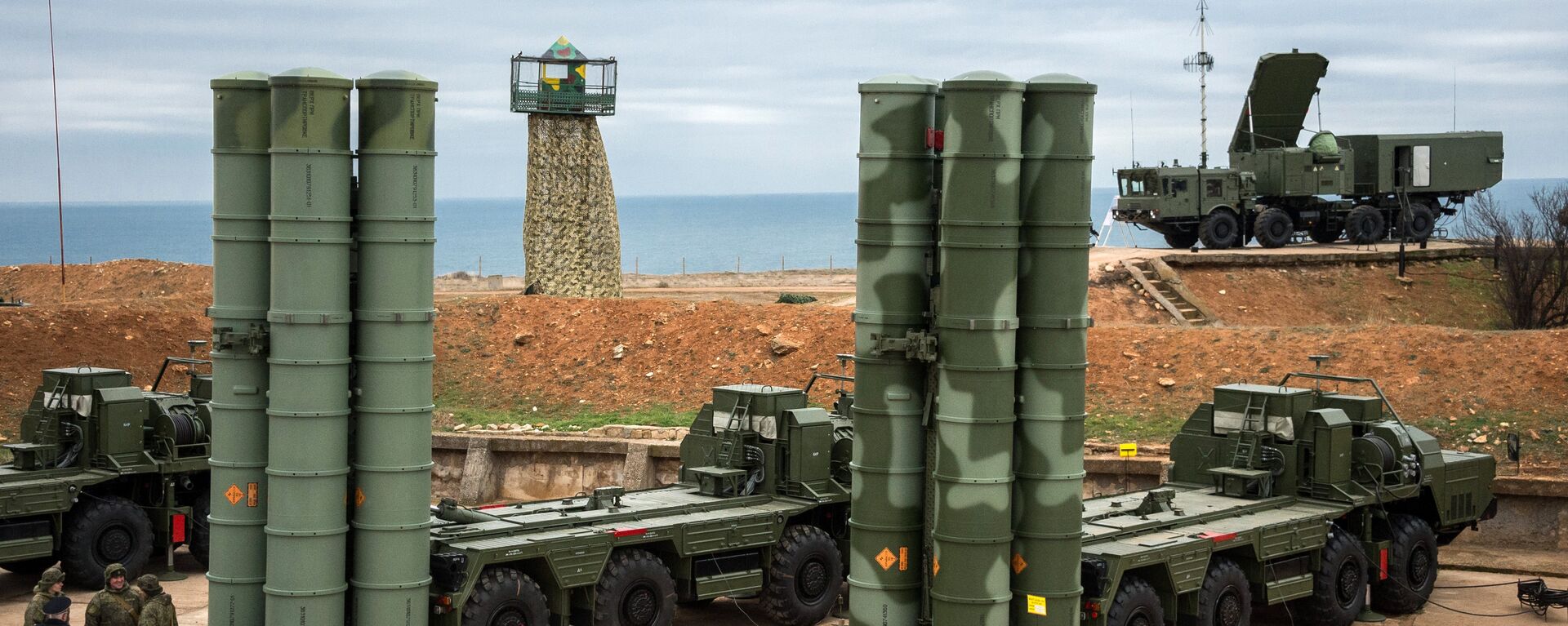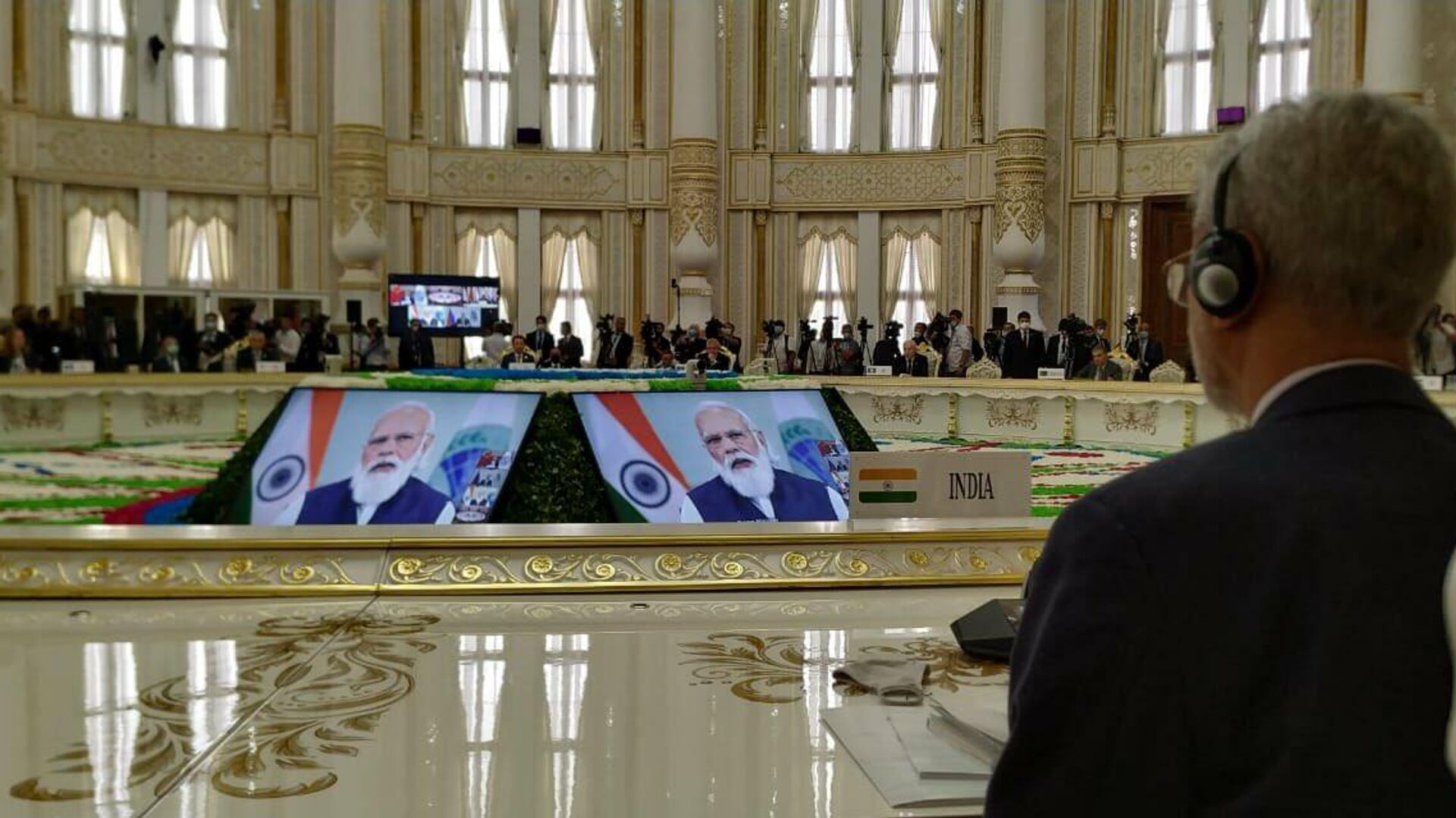https://sputnikglobe.com/20211231/2021-modi-governments-decisions-that-may-influence-indias-foreign-policy-in-years-to-come-1091945804.html
2021: Modi Government's Decisions That May Influence India's Foreign Policy in Years to Come
2021: Modi Government's Decisions That May Influence India's Foreign Policy in Years to Come
Sputnik International
The year 2021 wasn't kind to India, as it suffered setbacks such as the catastrophic second wave of the coronavirus pandemic and the US withdrawal from... 31.12.2021, Sputnik International
2021-12-31T18:45+0000
2021-12-31T18:45+0000
2022-11-23T13:02+0000
pakistan
joe biden
chinese people's liberation army (pla)
narendra modi
vaccine
us
russia
vladimir putin
china
afghanistan
https://cdn1.img.sputnikglobe.com/img/07e5/09/11/1089152357_72:0:1210:640_1920x0_80_0_0_26311fa4cb9906ee6902545c15a9d2be.jpg
"The purpose of partnerships for us is to increase capabilities; you don't do a partnership for the sake of partnership", Indian Foreign Minister S. Jaishankar said on 14 December. He underscored that things like national competition and advancement of national ambitions are very much a reality despite economic globalisation. The statement neatly summed up India's approaches to dealing with its allies and rivals in 2021, with New Delhi seeking to forge new alliances and seeking a balance in its political decisions throughout the year.Sputnik has taken a look at some of the Modei government's decisions that are likely to influence India's strategic moves in the coming years.Net Zero EmissionsPrime Minister Narendra Modi surprised the world in November when he announced India's commitment to achieving net zero emissions by 2070. Just about a week prior to Modi's announcement, India, along with a bloc of 23 developing nations known as Like-Minded Developing Countries (LMDC), blasted developed countries for proselytising net zero by 2050 as a universal goal. The LMDC vowed not to pledge "net zero emissions", as they believe it is against "climate justice". Several experts have expressed concerns over Modi's announcement as they fear it will weaken the LMDC against the developed world and hamper New Delhi's interests in South Asia.However, India made a strong statement on 13 December at the UNSC when it voted with Russia and China in opposition to a resolution that would include climate-related security risks as a "central component into comprehensive conflict-prevention strategies of the United Nations".On the domestic front, the net zero emissions target is set to affect everything — energy supply, transport, industry, air quality, and jobs. First-Ever Talks with TalibanIndia had taken a strong position against any kind of engagement with the Taliban for years. But the country was left with no option but to work with the Taliban following US-led NATO forces' withdrawal from Afghanistan without taking "New Delhi into confidence". In October, New Delhi held its first bilateral talks with the Taliban, signalling a decisive shift in its approach towards the Islamist group.The eight-nation Regional Security Dialogue on Afghanistan was seen as a strong effort by New Delhi to combat the notion that any lasting solution to Afghanistan can be discussed without India in the room. S-400 Delivery and Inaugural 2+2 Summit with RussiaDespite looming threats of US sanctions over the S-400 deal, India announced the delivery of the Russian air missile defence system during President Vladimir Putin's visit on 6 December.The two countries also renewed military-technical cooperation for the next decade.Experts dubbed the renewal of the agreement as a "major signal to Washington that despite [the] CAATSA (Countering America's Adversaries Through Sanctions Act) sword in the background, India is not likely to reel back imports of Russian defence equipment in the near to midterm."The beginning of the foreign and defence ministers' level talks between India and Russia is significant for Asia and the Pacific. Experts believe this mechanism will dilute the existing hurdles and hedges between Russia and India that evolved under the new geopolitical situation, i.e., India's alignment with the Quad and Moscow's closer ties with Beijing.Disengagement with ChinaIndia and China agreed to withdraw troops from forward posts in the Pangong Tso areas in February.Buffer zones were also created on the Indian side, denying the right to patrol, deploy, or develop infrastructure which the Indian Army had until April 2020.India hoped to negotiate with China on settling issues at other friction points, such as the Depsang Plains and Gogra Heights.But several military commander-level talks proved defence analysts somewhat right, as China refused to vacate its positions in the Depsang Plains, and satellite imagery shows that the People's Liberation Army has developed infrastructure near Pangong Tso.Both countries have now stationed over 50,000 troops at forward military posts in eastern Ladakh, which could flare up in the coming months.
https://sputnikglobe.com/20211221/india-deploys-1st-squadron-of-its-newly-acquired-s-400-triumf-system-along-pakistani-border-report-1091685114.html
pakistan
china
afghanistan
Sputnik International
feedback@sputniknews.com
+74956456601
MIA „Rosiya Segodnya“
2021
Rishikesh Kumar
https://cdn1.img.sputnikglobe.com/img/07e4/08/04/1080055820_0:0:388:389_100x100_80_0_0_40018ee210946d65d49ffba4f4c008e1.jpg
Rishikesh Kumar
https://cdn1.img.sputnikglobe.com/img/07e4/08/04/1080055820_0:0:388:389_100x100_80_0_0_40018ee210946d65d49ffba4f4c008e1.jpg
News
en_EN
Sputnik International
feedback@sputniknews.com
+74956456601
MIA „Rosiya Segodnya“
Sputnik International
feedback@sputniknews.com
+74956456601
MIA „Rosiya Segodnya“
Rishikesh Kumar
https://cdn1.img.sputnikglobe.com/img/07e4/08/04/1080055820_0:0:388:389_100x100_80_0_0_40018ee210946d65d49ffba4f4c008e1.jpg
pakistan, joe biden, chinese people's liberation army (pla), narendra modi, vaccine, us, vladimir putin, china, afghanistan, taliban, s-400, subrahmanyam jaishankar, indian army, nato, climate change
pakistan, joe biden, chinese people's liberation army (pla), narendra modi, vaccine, us, vladimir putin, china, afghanistan, taliban, s-400, subrahmanyam jaishankar, indian army, nato, climate change
2021: Modi Government's Decisions That May Influence India's Foreign Policy in Years to Come
18:45 GMT 31.12.2021 (Updated: 13:02 GMT 23.11.2022) The year 2021 wasn't kind to India, as it suffered setbacks such as the catastrophic second wave of the coronavirus pandemic and the US withdrawal from Afghanistan, which undoubtedly influenced the policy of New Delhi both in the region and towards allies.
"The purpose of partnerships for us is to increase capabilities; you don't do a partnership for the sake of partnership", Indian Foreign Minister S. Jaishankar
said on 14 December. He underscored that things like national competition and advancement of national ambitions are very much a reality despite economic globalisation. The statement neatly summed up India's approaches to dealing with its allies and rivals in 2021, with New Delhi seeking to forge new alliances and seeking a balance in its political decisions throughout the year.
Sputnik has taken a look at some of the Modei government's decisions that are likely to influence India's strategic moves in the coming years.
Prime Minister Narendra Modi surprised the world in November when he announced India's commitment to
achieving net zero emissions by 2070.
Just about a week prior to Modi's announcement, India, along with a bloc of 23 developing nations known as Like-Minded Developing Countries (LMDC), blasted developed countries for proselytising net zero by 2050 as a universal goal.
The LMDC vowed not to pledge "net zero emissions", as they believe it is against "climate justice".
Several experts have expressed concerns over Modi's announcement as they fear it will weaken the LMDC against the developed world and hamper New Delhi's interests in South Asia.
However, India made a strong statement on 13 December at the
UNSC when it voted with Russia and China in opposition to a resolution that would include climate-related security risks as a "central component into comprehensive conflict-prevention strategies of the United Nations".
On the domestic front, the net zero emissions target is set to affect everything — energy supply, transport, industry, air quality, and jobs.
"Indian policymakers need to plan for the transition and ensure that no vulnerable family loses in this process. But I believe that with advanced strategic planning, the job losses will be minimal, and we would be able to create an economy of the future. Hence, planning is the keyword here", Dr Vaibhav Chaturvedi, an economist who has been a part of government committees on energy and climate policy, told Sputnik.
First-Ever Talks with Taliban
India had taken a strong position against any kind of engagement with the Taliban for years. But the country was left with no option but to work with the Taliban following
US-led NATO forces' withdrawal from Afghanistan without taking "New Delhi into confidence".
In October, New Delhi held its first bilateral talks with the Taliban, signalling a decisive shift in its approach towards the Islamist group.
The eight-nation Regional Security Dialogue on Afghanistan was seen as a strong effort by New Delhi to combat the notion that any lasting solution to Afghanistan can be discussed without India in the room.
S-400 Delivery and Inaugural 2+2 Summit with Russia
Despite looming threats of US sanctions over the S-400 deal, India announced the delivery of the Russian air missile defence system during President Vladimir Putin's visit on 6 December.
The two countries also renewed military-technical cooperation for the next decade.
Experts dubbed the renewal of the agreement as a "
major signal to Washington that despite [the] CAATSA (Countering America's Adversaries Through Sanctions Act) sword in the background, India is not likely to reel back imports of Russian defence equipment in the near to midterm."

21 December 2021, 09:36 GMT
The beginning of the foreign and defence ministers' level talks between India and Russia is significant for Asia and the Pacific.
Experts believe this mechanism
will dilute the existing hurdles and hedges between Russia and India that evolved under the new geopolitical situation, i.e., India's alignment with the Quad and Moscow's closer ties with Beijing.
India and China agreed to withdraw troops from forward posts in the
Pangong Tso areas in February.Buffer zones were also created on the Indian side, denying the right to patrol, deploy, or develop infrastructure which the Indian Army had until April 2020.
India hoped to negotiate with China on settling issues at other friction points, such as the Depsang Plains and Gogra Heights.
But several military commander-level talks proved defence analysts somewhat right, as China
refused to vacate its positions in the Depsang Plains, and satellite imagery shows that the People's Liberation Army has developed infrastructure near Pangong Tso.
Both countries have now stationed over 50,000 troops at forward military posts in eastern Ladakh,
which could flare up in the coming months.






